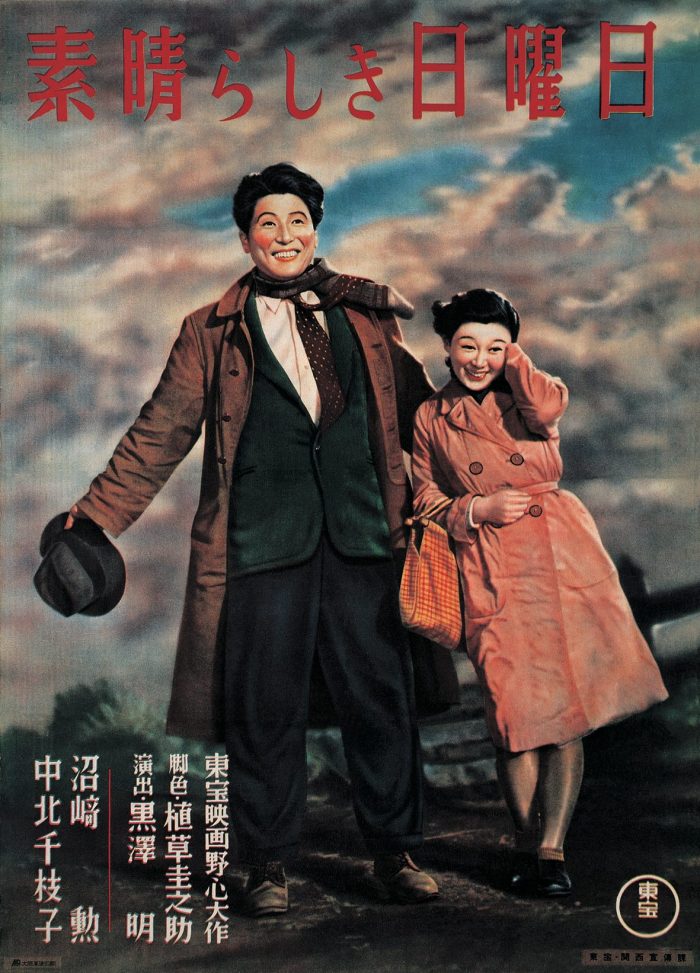Something Like a Filmography takes a (brief) look at the filmography of Akira Kurosawa. Twice a month, Chris and Jon share their impressions of each film, both on its own terms and in terms of Kurosawa’s legacy and its intersection in the Cinema Dual hosts’ lives.
FROM THE BOX: This affectionate paean to young love is also a frank examination by Akira Kurosawa of the harsh realities of postwar Japan. During a Sunday trip into war-ravaged Tokyo, Yuzo and Masako look for work and lodging, as well as affordable entertainments to pass the time. Reminiscent of Frank Capra’s social-realist comedies and echoing contemporaneous Italian neorealism, One Wonderful Sunday touchingly offers a sliver of hope in dark times.

WHAT CHRIS THOUGHT: Leave it to Kurosawa to tell a story that, free from the shackles of pre-and post-war propaganda and government influence, he crafts within this beautiful, simple love story a film that positively radiates with post-war Japanese life. Everything that didn’t work for me in No Regrets For Our Youth – from Setsuko Hara’s performance to the on the nose leftist sentiment – is sumptuously executed in One Wonderful Sunday. Chieko Nakakita’s Masako exudes an idealism that perseveres in the face of a very real reality where the war has left nothing for the honest while providing feasts for those who profit mercilessly off the weak. As Yuzo, Isao Numasaki comes to exemplify all the anxiety and pressure of the common man, but also being trapped in the gender roles proscribed at the time and how that shapes his responses when in conflict with Masako’s dreams. There’s so much to love about this far from simple “simple” story: the incredible framing and camera work, unfettered and free to follow our heroes from the back alleys of successful lounges to the bombed out neighborhoods where dreams can play out. And that ending…an ending at once hopelessly sentimental yet invoked with such passion and desperation not only did I clap, but I cried while doing so.

WHAT JON THOUGHT: The contemporary nature and location of post-war Tokyo in One Wonderful Sunday already sets Kurosawa up to set up new kinds of shots that we haven’t seen from him up until this point. Instead of period costumes and sets on a soundstage, Kurosawa gets to show city life in all its comings and goings. But he doesn’t just let scenery do the work for him, as he employs a lot more tracking shots, notably in the scene where Yuzo tries and fails to visit an old army friend at their new club. You can briefly see the tracks in the hallway used for those shots. That sequence also uses close ups on the club employees (and their clothing) to emphasize how out of place Yuzo is in this environment. But from a technical perspective, the thing most people remember about this movie is in the final sequence when Masako, trying to console Yuzo after his own attempts to cheer Masako up have failed, turns to the camera and implores the audience to cheer Yuzo on, so that they can imagine hearing the symphony that they were not allowed to see earlier in the film. Breaking the fourth wall is a bold and risky choice for Kurosawa, but I can only speak to its effectiveness by admitting that for no reason whatsoever, I sitting alone in my house watching this movie, clapped when I was asked to because I felt compelled.

ANYTHING ELSE, CHRIS? Whereas his later films would owe a debt to John Ford, here we clearly see the influence Frank Capra had on Kurosawa. The simple thread of the diminishing funds outlines the narrative as much as the characters do, and though it may get overly sentimental for some (especially with that fourth wall breaking climax), I find it of a piece with Kurosawa’s other films and how focused they are on the humanity of their characters. There may not be a lot to say in One Wonderful Sunday, but I’m still happy to sit through its simple pleasures and luxuriate in the performances of Nakakita and Numasaki, the roving camera, and especially the baseball game. A simple delight is a delight all the same.
ANYTHING ELSE, JON? I might need to offer a slight self-correction to my last sentence. As Chris mentioned, the dwindling finances provides clear narrative stakes for our two protagonists, and given their situation, both Yuzo’s pragmatism and Masako’s idealism are reasonable responses. But when Yuzo finally starts to get on Masako’s level about their planned café, and then later conducts the imaginary symphony, you can feel how hard Yuzo is really trying to not drag Masako down with him. When he then falters and she steps in to break the fourth wall, she’s helping him to help her. Their mutual devotion to each other is touching, and worth participating in.

THE FINAL WORD(S): For Chris One Wonderful Sunday rights the ship and springs along to a lovely if light conclusion. For Jon, the movie plucks just the right amount of heartstrings to stick the landing.
NEXT TIME: Kurosawa goes noir, and we finally get the classic matchup we’ve been waiting for in Drunken Angel.


Leave a comment